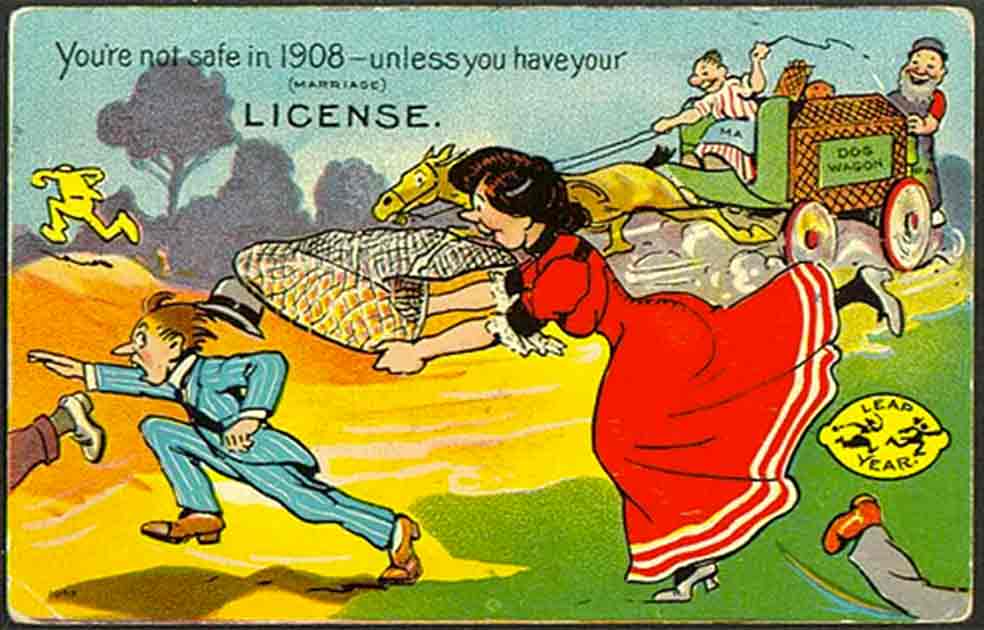Women Have Proposed Marriage to Men on Leap Day for Hundreds of Years
Welcome to February 29th, the Leap day that comes around but once every four years! In the age of viral marriage proposals, the persistence of outdated traditions whereby men inevitably go down on one knee to pop the question—often after asking permission from their girl’s father—bewilder me. Well into the 21st-century, these archaic customs continue to dissuade women from exercising their equal right to choose, court and propose to the person they want to spend their life with, instead waiting for the man to take the initiative. But even the tradition of women proposing on Leap Day fails to balance the situation.
- How to Sleuth Your Ancestral History From Your Surname
- Bizarre Pirate Traditions Most People Don't Know About (Video)
Origins of Leap Day, February 29th
The origins of Leap Day, Bachelor’s Day or Ladies’ Privilege, where women can propose to men every four years on the 29th of February, are open to question. Leap years themselves have a rich history, dating back to Julius Caesar's calendar reforms, with subsequent adjustments by Pope Gregory XIII in 1582. Even so, the Leap Day tradition is attributed to a fifth-century pact between Irish national saints Brigid of Kildare and Patrick, sparked by Brigid's frustration with men's tardiness in proposing.
Some believe the tradition began with a law by Margaret of Scotland, the Maid of Norway, in 1288, mandating penalties for men who refused Leap Day proposals, such as gowns, gloves, or kisses. Neither of these stories is probable. Estimates hold that Brigid was just ten when Patrick died, while in 1288 Margaret was five, living in Norway and no record of such a law exists.
In all probability the practice grew out of a toxic environment in Ireland whereby the unmarried were subjected to abuse. Before Lenten restrictions kicked off, The Irish Times reported that “boys had free license to chase the girls, corral them with ropes, tie them up and eventually douse them with water.” As reported in RTÉ, Shrove Tuesday or Skellig Night historically involved the public mockery of single people, and by the 19th century offensive poems and lists ridiculing the unwed had gained popularity.

In the early 1900s adverts made the most of gender stereotypes related to marriage and Leap Day traditions to promote their merchandise. This Corticelli advertisement included the text “The Perils of Leap Year”. (Public domain)
In the United States, from the 1700s to the 1900s, Leap Day proposals gained widespread recognition and were belittled in millions of Leap Day postcards, advertisements and the media. According to Katherine Parkin's article in the Journal of Family History, the emancipatory potential of this celebration fell short. Instead, “the leap year custom helped ensure that men continued to hold the power in matters of matrimony.”
Simultaneously touted as “feminist” (Atlas Obscura) and “sexist” (Vox), Leap Day proposals continue to this day. Meanwhile, Reuters reported on suggestions to use Leap Day as an opportunity to start conversations about bridging the gender pay gap instead. More to the point, and to quote a 1970s article from The New York Times, “in these liberated times, every day is Leap Day.”
Top image: Millions of postcards made a mockery of Leap Day traditions which gave women the opportunity to propose to men once every four years on the 29th February. Source: Public domain


















Comments
I reject this proposed wokeness centered on who proposes to who which somehow feebly stumbles into the realm of gender pay gaps. Perhaps the reason no proposals have been forthcoming is because of a worldview most people are tired of having pushed on them. The few willing to humor such silliness lack the self confidence to ask you out, let alone propose marriage, therefore you yourself perpetuate your cycle.